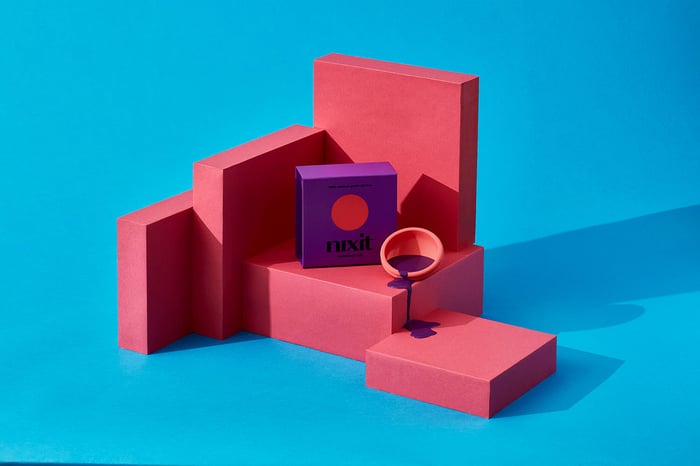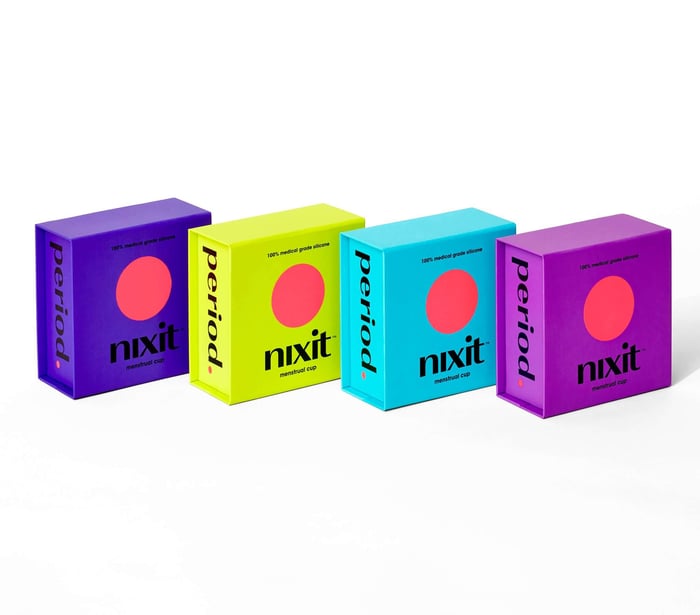Our menstrual health is important and when we experience problems it can be a worrying and uncertain time. In this post, we discuss three conditions that impact the menstrual cycle and how a nixit menstrual disc can help with heavy bleeding.
Endometriosis
Endometriosis affects women during their reproductive age and affects around 176 million people worldwide regardless of ethnic background or culture. There is currently no cure for endometriosis, however, once menopause has started the symptoms stop.
During a period the cells (endometrial stroma) that have built up inside the womb are shed, however, those with endometriosis have cells that are trapped outside of the uterus. As these cells have nowhere to go they can cause inflammation and pain, adhesions then occur which can leave scar tissue that binds organs together, meaning that cysts can form. The scar tissue can affect the ovaries, fallopian tubes, bladder, bowel and even the liver and lungs.
Those with endometriosis experience varying symptoms and some will have no symptoms at all.
Symptoms may be present throughout the month or during a period and can include:
- Pelvic pain
- Painful and heavy periods
- Pain during or after sex
- Tiredness
- Problems with conceiving
- Diahorrea
- Bloating
- Irregular bleeding
- Negative emotional impact
A doctor can often diagnose endometriosis from the symptoms described. It may be that tests are advised and this can include a laparoscopy which is a small surgical procedure.
Treatments vary and what works for someone may not work for others. There are pain relief treatments which you can try at home including using a hot bottle or a heat pad. Yoga may help with relieving pain and stress, also taking ibuprofen can reduce the inflammation.
Other options include hormonal treatment, such as the contraceptive pill, Mirena coil or progestogens. Taking hormones tricks the body into thinking it’s either pregnant or in a menopausal state which can reduce symptoms. Physiotherapy is an option as the exercises will be prescribed to reduce pain and strengthen abdominal muscles. As a last resort, your doctor may suggest surgery as an option.
Adenomyosis
Adenomyosis affects 1 in 10 women. It is similar to endometriosis, however the cells that line the uterus grow into the uterus wall rather than outside of the uterus. The cells respond to the natural order of the menstrual cycle and thicken, break down and bleed. However, they remain inside of the uterus wall and this can cause inflammation and pain.
Everyone’s experience of adenomyosis differs, some experience mild pain and others extreme pain and discomfort. It is possible to have adenomyosis and endometriosis.
There are various symptoms and these include:
- Painful and heavy periods
- Painful sex
- Chronic pelvic pain
- Prolonged periods
- Infertility
- Enlarged uterus
It is unknown why adenomyosis happens, however, it is thought that it may be connected to those who have had more than one child, used anti-depressants for a prolonged period of time, or as a result of the body healing itself after an injury. It’s also possible that hormones, the immune system, and genes may play a role in adenomyosis occurring.
Adenomyosis can be diagnosed through a pelvic exam to check for soreness, bloating and cysts, a doctor may also recommend an MRI scan or a vaginal ultrasound to confirm a diagnosis.
The treatment for adenomyosis is similar to that of endometriosis, which can include pain relief, hormonal medications, exercise and applying heat.
Polycystic Ovary Syndrome (PCOS)
PCOS affects 7 million women worldwide and it is thought that there are more women with the condition who are simply not aware that they have it.
Someone with PCOS will experience harmless, underdeveloped, fluid-filled sacs on their ovaries known as follicles which are unable to release an egg, therefore ovulation does not occur.
The signs and symptoms of PCOS usually begin during the teen years or early 20s. The symptoms vary.
Some of the common symptoms are:
- Difficulty getting pregnant
- Weight gain
- Excess hair around the face, chest, lip, nipples and a line of hair from the tummy button down
- Patches of dark skin in your armpit, groin or neck
- Oily skin or acne
PCOS is often diagnosed using a blood test to check the hormone levels, the doctor may also refer the patient to have a scan and a pelvic examination to check for cysts.
There is no cure for PCOS but there are treatments which can help manage the symptoms and address other issues such as infertility. Treatments can include the contraceptive pill and medication to reduce hair growth. Switching to a healthier diet and lifestyle can have a positive impact. There is also the possibility of having a simple surgical procedure called Laparoscopic Ovarian Drilling. This is a heat laser that will destroy tissues around the ovaries that are producing the testosterone and may enable ovulation.
The nixit Menstrual Disc
So how do you manage your period when you are also dealing with a health condition that causes heavy bleeding?
One of the benefits of using the nixit menstrual disc is that it holds up to 70 ml of blood which is more than 4 super plus tampons can absorb.
A concern for those that have heavy periods is that they will experience leaking either during the day or throughout the night - the nixit menstrual disc can be worn for up to 12 hours and does not leak provided that it is inserted correctly.
Exercising can be a great pain and stress relief for those faced with discomfort during their period. With the nixit disc you can move freely allowing you to exercise whether that’s yoga or running a marathon.
Irregular bleeding can often be an issue and being caught out with no tampons or pads is a daunting prospect. Carrying your nixit menstrual disc in your bag ensures that you always have period protection with you to see you confidently through the rest of your day.
Wrapping It Up
Endometriosis, Adenomyosis and PCOS can all cause painful and heavy bleeding as well as a whole host of other physical and emotional symptoms.
There is no cure for the above conditions and this can make managing your period a very uncomfortable and frustrating time. Finding ways to reduce pain, manage stress and anxiety are key to taking care of yourself.
The nixit menstrual disc can play a huge role in this as it is able to hold up to 70 ml of blood, this provides emotional comfort as it can be worn for up to 12 hours and eliminates the hassle of changing tampons and pads throughout the day and night.
To learn more about nixit, be sure to check our range of period products and our reusable menstrual disc.
Always seek your doctor's advice if you have concerns about the above health conditions or are considering taking medication.




